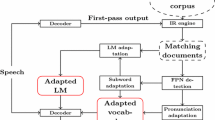Abstract
The article considers the linguistic foundations of the Kazakh language for the Kazakh speech synthesis system. A formalization of phonological rules is presented for the implementation of an automatic transcription of words into transcriptional notation, which can be applied to speech synthesis and recognition systems.
Access this chapter
Tax calculation will be finalised at checkout
Purchases are for personal use only
Similar content being viewed by others
References
Baia, A.E., Biondi, G., Franzoni, V., Milani, A., Poggioni, V.: Lie to me: shield your emotions from prying software. Sensors 22(3), 967 (2022). https://doi.org/10.3390/s22030967
Milani, A., Franzoni, V., Biondi, G.: Parsing tools for Italian phraseological units. In: Gervasi, O., et al. (eds.) ICCSA 2021. LNCS, vol. 12955, pp. 427–435. Springer, Cham (2021). https://doi.org/10.1007/978-3-030-87007-2_30
Atif, M., Franzoni, V., Milani, A.: Emojis pictogram classification for semantic recognition of emotional context. In: Mahmud, M., Kaiser, M.S., Vassanelli, S., Dai, Q., Zhong, N. (eds.) BI 2021. LNCS (LNAI), vol. 12960, pp. 146–156. Springer, Cham (2021). https://doi.org/10.1007/978-3-030-86993-9_14
Franzoni, V., Milani, A., Mengoni, P., Piccinato, F.: Artificial intelligence visual metaphors in e-learning interfaces for learning analytics. Appl. Sci. 10(20), 7195 (2020). https://doi.org/10.3390/app10207195
Magueresse, A., Carles, V., Heetderks, E.: Low-resource languages. a review of past work and future challenges. ArXiv, abs/2006.07264 (2020)
Sebastian, R.: The 4 biggest open problems in NLP (2019)
Emily, B.: High Resource Languages vs Low Resource Languages. The Gradient (2019)
Dossanova, N., Abdimanuly, O., Kapagan, E.: The influence of Akhmet Baitursynov’s literary publicistic heritage on the spiritual development of Kazakh people at the beginning of The XXth century. J. Hist. Cult. Art Res. 9, 286 (2020). https://doi.org/10.7596/taksad.v9i4.2669
Allworth, Ed.: Central Asia: A Century of Russian Rule. 1st Edn. University Presses of California, Columbia and Princeton (1967)
Abdimanuly, O.: Akhmet Baytursynuly: zertteu-essay. Arda, Almaty, 293 b. (2007)
Dakenov, M.: Baitursynov’s role in the development of the sociology of culture and education in Kazakhstan. Bulletin Abay Kazakh National Pedagogical University (2012)
Aibarshyn, A.: The Man Who Led His Nation to Enlightenment: Kazakhstan Marks 150th Anniversary of Prominent Scholar Akhmet Baitursynov. The Astana times (2022)
Baytursinov, A.: New primer with drawings (8–17 thousand). Qizilorda (1926). (in Kazakh)
Baytursinov, A.: Problems of Kazakh linguistics. Abzal-Ai, Almaty (2013). (in Kazakh)
Baytursinov, A.: Til – qural. Sardar, Almaty (2009). (in Kazakh)
Baytursinov, A.: Til tagilimi. Pavlodar (2008). (in Kazakh)
Baytursinov, A.: Forty examples: poems. Zhazuschy, Almaty (2001). (in Kazakh)
Baytursinov, A.: Alphabet: new manual. Rauan, Almaty (1998). (in Kazakh)
Baytursinov, A.: New rules. Zhety zhargy, Almaty (1996). (in Kazakh)
Baytursinov, A.: A five-volume collection of works. Volume 1: Poems, literary and scientific research. Alash, Almaty (2003). (in Kazakh)
Yessenbayev, Z., Karabalayeva, M., Sharipbayev, A.: Formant analysis and mathematical model of Kazakh vowels. In: Proceedings - 2012 14th International Conference on Modelling and Simulation, UKSim 2012, article№ 6205485, pp. 427–431 (2012). https://doi.org/10.1109/UKSim.2012.66
Yessenbayev, Zh., Saparkhojayev, N., Tibeyev, T.: Implementation of the intelligent voice system for Kazakh. J. Phys.: Conf. Ser 495(1), cтaтья № 012043 (2014). https://doi.org/10.1088/1742-6596/495/1/012043
Sharipbayev, A.A., Bekmanova, G.T., Shelepov, V.U.: Formalization of Phonologic Rules of the Kazakh Language for System Automatic Speech Recognition. http://dspace.enu.kz/handle/data/1013. Accessed 12 May 2022
Bekmanova, G., Yergesh, B., Sharipbay, A., Mukanova, A.: Emotional speech recognition method based on word transcription. Sensors (Basel, Switzerland) 22(5), 1937 (2022). https://doi.org/10.3390/s22051937
Zu, V.V.: Linguistic approach to automatic recognition of speech signals. In: Proceedings of the Institute of Electrical and Radio Electronics Engineers (TIIER). Speech Communication with Machines, no. 73, pp. 51–54 (1985)
Sharipbayev, A., Torekhanov, S.: Qazaq tili dauisti dibistarinin matematikalik modeli. L.N.Gumilyov atindagi Euraziya ulttik universiteti. «Khabarshi» № 3–4, 2002. 14. Qazaq grammatikasi, Astana (2002)
Bekmanova, G., Nicenko, A., Sharipbayev, A., Shelepov, V.: O nekotoryh voprosah svyazannyh s raspoznavaniem kazakhskoy rechi. Bulletin ENU, Astana (2009)
Kazakh Grammar. Phonetics, Word Formation, Morphology, Syntax; Astana-Poligraphy: Astana, Kazakhstan (2002). (in Kazakh)
Babin, D., Mazurenko, I., Holodenko, A.: On the Prospects of Creating a System of Automatic Recognition of Fused Russian-Speech. Mir, Moscow (1999)
Bekmanova, G.: Transcript of Kazakh words for speech recognition. Bulletin NAN RK, Almaty (2009)
Sharipbayev, A., Bekmanova, G.: Mathematical methods of recognizing combinations of sounds of the Kazakh language. In: Proceedings of the International Scientific-Practical Conference “Innovative Technologies: Integration of Science, Education and Business” KazNTU. К. Satpayeva. Almaty (2008)
Bekmanova, G., Nicenko, A., Sharipbayev, A., Shelepov, V.: Algorithms for recognizing Kazakh words as a whole. Structural classification of words of the Kazakh language. Bulletin ENU, Astana (2010)
Funding
This research is funded by the Science Committee of the Ministry of Education and Science of the Republic of Kazakhstan (grant no. BR11765535).
Author information
Authors and Affiliations
Corresponding author
Editor information
Editors and Affiliations
Rights and permissions
Copyright information
© 2022 The Author(s), under exclusive license to Springer Nature Switzerland AG
About this paper
Cite this paper
Bekmanova, G., Yergesh, B., Sharipbay, A., Omarbekova, A., Zakirova, A. (2022). Linguistic Foundations of Low-Resource Languages for Speech Synthesis on the Example of the Kazakh Language. In: Gervasi, O., Murgante, B., Misra, S., Rocha, A.M.A.C., Garau, C. (eds) Computational Science and Its Applications – ICCSA 2022 Workshops. ICCSA 2022. Lecture Notes in Computer Science, vol 13379. Springer, Cham. https://doi.org/10.1007/978-3-031-10545-6_1
Download citation
DOI: https://doi.org/10.1007/978-3-031-10545-6_1
Published:
Publisher Name: Springer, Cham
Print ISBN: 978-3-031-10544-9
Online ISBN: 978-3-031-10545-6
eBook Packages: Computer ScienceComputer Science (R0)




